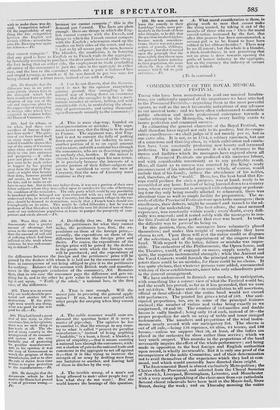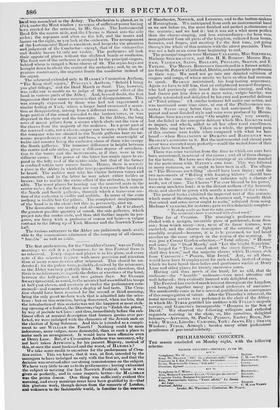COMMENCEMENT OF THE ROYAL MUSICAL FESTI VAL.
THOSE who have been accustomed to read our musical lucubra- tion:, are sulliciently apprised of the importance we have attached to the Provincial Festivals,—regarding them as the most powerful agents, as well us the most favourable indications of any advance in our musical taste : and we have often endeavoured to stimulate public attention and incite ptoressional enterprise towards a similar attempt in the Metropolis, where every facility exists to insure perfection and command success. In estimating the general character of the Royal Festival, we shall therefore have regard not only to its positive, but its compa- rative excellences—we shall judge of it not merely per se, but as one inter alia. It is not, as in 178-1, a solitary specimen, but one of a numerous and thriving class, in which cultivation and emula- tion have tzen constantly producing new beauty and increased perfection. We must also estimate it with a reference to the means and facilities which its managers have enjoyed above all others. Provincial Festivals are produced with immense labour, and with considerable uncertainty as to any profitable result. Here, all doubt as to success was removed by the King's ready announcement of his intended presence; which, of course, would include that of his family, induce the attendance of his nobles, and, therefore, of the " world." Ifere, too, the best band that Eu- rope could produce for such a purpose, was at band, ready to be assembled at any hour. Instead of being hurried down to a country town, where every moment is occupied with rehearsing or perform- ing (one (lay only being usually allotted to rehearsal), there was abundant time as well as ample facility for preparation. The re- cot ds of all the Provincial Festivals were open to the managers ; their excellences, their defects, might be scanned and turned to the ad- vantage of the undertaking. The best advice, the most matured experience, was constantly within reach ; every' doubt, every diffi- culty was removed ; and it rested solely with the managers to ren- der this Festival the most perfect that ever was heard. In truth, the difficulty was to prevent its being so. In this position, then, the managers have voluntarily placed themselves; and under this weight of responsibility they have chosen to act. Upon them will rest the entire credit or disgrace of the selections, and of the appointment of the singers and the band. With regard to the latter, failure or mistake was impos- sible. The orchestras of the Philharmonic, the Opera-house, and the Theatres, would, if engaged en ;muse, supply nearly, if not quite, the requisite instrumental strength ; while the Ancient and the Vocal Concerts would furnish the principal singers. On these points there could be no mistake, for there could be no choice. It was quite obvious, that whatever persons were added, unconnected with any of these establishments, must take only subordinate parts in the general arrangement. We have endeavoured to furnish our readers, by anticipation, with something like a correct view of what the Festival would be; and the result has proved, as far as it has proceeded, that we were not mistaken. We have stated—in contradiction to all assertions, official or demi-official—that the entire band would not exceed 600 performers. The printed list gives a total of 589. Our anti- cipated proportions, too, are in some of the principal features realized ; the number of violins and violas being exactly as we conjectured, 80 and 30. The number of violoncellos and double basses is sadly limited ; being only 18 of each, instead of 30—the proper proportion for such an array of treble and tenor stringed instruments. The numbers and proportions of the wind instru- ments nearly accord with our anticipatory list. The chorus is out of all rule,—being 136 sopranos, 68 altos, 64 tenors, and 100 basses,—unless we suppose that 30, at least, of the ladies are placed in the orchestra for show rather than service; which we very much suspect. This mistake in the proportions of the band necessarily impairs the effect of the whole performance; and being made in opposition to the best foreign and English authorities upon record, is wholly inexcusable. But it i3 only one proof of the incompetence of the noble Committee, and of their determination not to avail themselves of the experience which they had at com- mand, and which would assuredly have directed them aright. The Instrumental Band is almost exclusively Metropolitan; the Chorus chiefly Provincial, and selected from tire Choral Societies of Norwich, Liverpool, Birmingham, Leicester, and Manchester with a very scanty sprinkling of the choir-men from our cathedrals Several choral rehearsals have been held in the Music-hall, Store Street, during the week ; and on Thursday morning the entire
band was assembled in the Abbey. TheOrchestra is placed, as in 1784, under the \Vest window ; an organ of sufficient power having been erected for the occasion, by Mr. GRAY. The Instrumental Band fills the centre aisle, and the Chorus is thrust into the side aisles ; the impieties and altos on the left, and the tenors and basses on the right, as you look at the orchestra. The arrangement of the Instrumental Band is excellent, and bespeaks the attention and judgment of the Conductor—except, that of the violoncellos and double basses 12 only are visible. The performers all took their appoiteed places without the slightest bustle or confusion. The front row of the orchestra is occupied by the principal singers, behind whom is ranged a Semi-chorus of 40. The organ-keys are brought down to about the centre of the orchestra ; and, by an in- genious contrivance, the organist fronts the conductor instead of the organ.
The rehearsal extended only to II AN DEL.S Coronation Anthem, "The King shall rejoice," Puecenn's Anthem, " Behold I bring you glad tidings," and the Dead March in Saul. This, however, was sullic•ent to enable us to judge of the general effect of the band in various parts of the Abbey. And, beyond doubt, the first impression that the senses receive is that of disappointment. This was strongly expressed by those who had not experienced a similar feeling at York, where a larger band occasioned a sensa- tion as disappointing, arising from a different cause. At York, a large portion of the sound ascended to the lantern tower, or was dispersed in the choir and the transepts. In the Abbey, the long rows of massy pillars form a screen which shuts out the view of the chorus from the majority of the auditors. In a great part of the reserved seats, not a clot us-singer can be seen; while those of the company who ale situated in the North galleries hear an im- mense prepunderauce of tenor and bass, a similar, overweight of treble and counter being the exclusive share of those who occupy the South gallei ies. The immense difference in height between the centre and side aisles, give; a different degree of ieverbera- Con to the voices and the instruments, as if they were in two different looms. The power of the latter has ample space to ex- pand in the lofty mil of the centre aisle, but that of the former is confined within very narrow limits. Hence, there is scarcely a place in the Abbey in which the true proportions of the band can be heard. The auditor may take his choice between voices and instruments, and in the latter he may select either trebles or basses; but to realize the entire effect of the orchestra, is impos- sible. The worst places for hearing ace the reserved seats in the centre aisle ; the best (but these are very few) some back seats in the North and South galleries, through which a transverse sec- tion of the orchestra is visible and audible. In many of the seats nothing is visible•but (be pillars. The completest amalgamation of the band is in the choir ; but this is, perversely, shut up.
The decorations are tawdry and ill-contrived. As if to absorb the greatest possible quantity of sound, the side galleries, which project into the centre aisle, and thus still further impede its pro- gress, are hung with a profusion of coarse red baize—a vulgar contrast to the fitting up of York Minster and the Norwich Town- hall.
The various entrances to the Abbey are judiciously made avail- able to the commodious admission oi the company of all classes, " humble" as well as noble.























 Previous page
Previous page